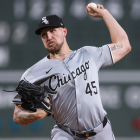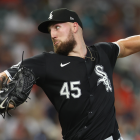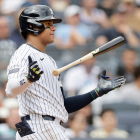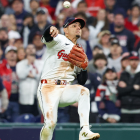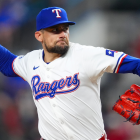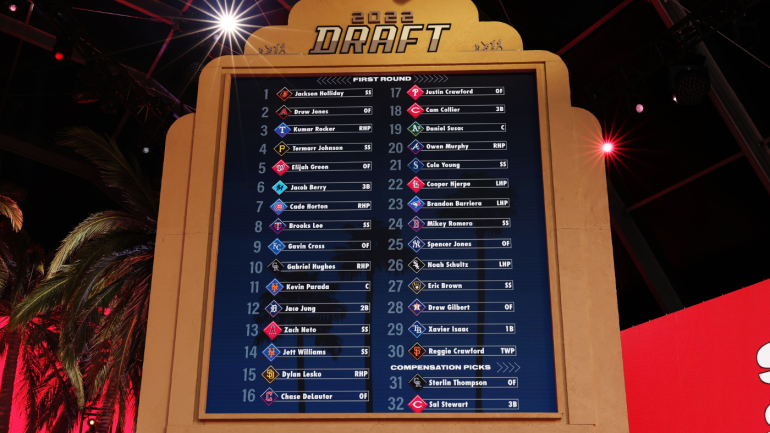
On Sunday night, MLB's annual amateur draft begins in Seattle. More than 600 names spanning 20 rounds will be called this year and a future Rookie of the Year will almost definitely be selected. Maybe a future MVP or Cy Young winner will hear his name, possibly even a Hall of Famer. The amateur draft is sport's great mystery box. You never really know what to expect as the names are being announced.
One thing you will not hear Sunday night, however, is commissioner Rob Manfred announcing a trade at the podium. That, say, the Angels are sending the No. 11 pick and a few prospects to the White Sox for reigning AL Cy Young runner-up Dylan Cease. Or that the Mariners are trading up by packaging the No. 22 and 29 picks to get No. 9 from the Rockies.
Draft pick trading is not allowed in baseball. It is an outdated rule that should no longer exist under this simple guiding principle: baseball is the entertainment business and trades are entertaining. I mean, sure, it stinks when your favorite player gets shipped out, but trades and trade rumors are fun in general. Allowing teams to trade picks gives them another avenue to make deals.
Everything else in baseball is tradeable. You can trade MLB players. You can trade prospects. You can trade bonus pool money to sign international amateur free agents. You can even trade managers and front office employees. But if you want to dangle a future first-round pick to get that missing piece for the postseason push, forget it. That's not allowed for some reason.
Admittedly, the timing is weird. The MLB draft takes place in the middle of the season, not in the offseason like other sports, though I don't see that as a dealbreaker. Call it a quirk. Nothing all the smart people running the billion dollar corporations we call baseball teams can't figure out. Let's talk this out, shall we? Here's how draft pick trading could work in MLB:
How would it work?
The other major North American sports leagues, particularly the NBA, have rules governing draft pick trades. In the NBA, you can not trade your first-round pick in back-to-back years, and you can only trade picks seven years into the future. That last bit is a good and important rule, otherwise teams would just trade picks 15-20 years in the future, when the lack of picks would be some other GM's (and owner's?) problem. There has to be a limit somewhere.
MLB introduced draft bonus pools as part of the 2011-16 collective bargaining agreement. In a nutshell, every pick in the top 10 rounds is assigned a slot value, and your total bonus pool is the sum of those slot values. The bonus pool is not a hard cap, though there are penalties for excess spending. Every pick in rounds 11-20 come with a $125,000 slot value, and every dollar in excess of that counts against the bonus pool.
The most straightforward solution is making every pick in rounds 1-10, the picks tied directly to the bonus pool, tradeable. If you trade a pick, you trade the slot value associated with that pick, meaning you have less money to spend on your draft class and your trade partner gets more money to spend on their draft class. Easy enough, right? Let's use the Giants as an example. Here are their 2023 draft picks in rounds 1-10, and the associated slot values:
| Round | Pick | Slot value |
|---|---|---|
1 | 16 | $4,326,600 |
2 | 52 | $1,620,800 |
Compensation | 69 | $1,074,100 |
3 | 85 | $830,900 |
4 | 117 | $569,100 |
5 | 153 | $400,600 |
6 | 180 | $314,800 |
7 | 210 | $246,500 |
8 | 240 | $198,800 |
9 | 270 | $177,500 |
10 | 300 | $167,200 |
That No. 69 pick is the compensation pick the Giants received for losing qualified free agent Carlos Rodón this past offseason, so hey, San Francisco has an extra pick. They have an extra pick and they're in the postseason race! The Giants would seem like a prime candidate to trade a pick this summer. Like, say, No. 85 (and the $830,900 slot value) to the Nationals for righty reliever Kyle Finnegan. Alas and alack, the Giants can not trade a pick to strengthen their roster. Draft pick trades aren't allowed 😞.
This is just a hypothetical, of course, but that's how draft pick trading in MLB could work. Allow clubs to trade any and all picks in rounds 1-10 along with the associated bonus pool money, and we can even allow them to attach lottery protections now that the MLB draft features a lottery for the top six picks. Conditional picks (this third rounder becomes a second rounder if you re-sign that rental player, for example) could work too. I'm cool with allowing teams to trade first round picks in consecutive years, though I would limit trades to picks within the next five years. There has to be a limit somewhere, right? Right. Onward.
What about free agent compensation?
The NHL has a restricted free agency system and if you sign another team's restricted free agent, you have to send them draft picks as compensation. The exact picks depend on the contract amount, but, most importantly, if you don't have those picks, you can't sign the player. If the compensation would be a second rounder and you traded your second rounder last year, too bad. You cannot sign the player unless you can pay the price, period.
Would MLB have a similar issue with qualified free agents? When you sign a qualified free agent (a free agent who rejected the qualifying offer) you must forfeit a draft pick(s). Which pick(s) depends on your revenue sharing and competitive balance tax status. The Phillies, for example, surrendered their second- and fifth-round picks to sign Trea Turner. If they had traded their second-round pick last year, say in the David Robertson deal with the Cubs, does that mean they wouldn't have been able to sign Turner because they didn't have the second round pick to forfeit?
Fortunately, this problem already has a solution. Here is Article XX(B)(4)(c)(i)(A-C) of the collective bargaining agreement, which covers free agent compensation. Apologies for the boring legalese. The important stuff is in bold:
(i) As set forth below, for each Qualified Free Agent subject to compensation whom it signs, the signing Club ("Signing Club") shall have its Signing Bonus Pool in the next international signing period (as described in Attachment 46) reduced and/or forfeit one or more selections in the next Rule 4 Draft, as follows:
(A) If the Signing Club was a Revenue Sharing Payee (as defined in Article XXIV) and not market disqualified in the Revenue Sharing Year that encompasses the most recently completed championship season, it shall forfeit its third-highest available selection in the next Rule 4 Draft.
(B) Notwithstanding subsection (A) above, if the Signing Club was a CBT Payor in the Contract Year (as defined in Article XXIII) that encompasses the most recently completed championship season, it shall forfeit its second-highest and fifth-highest available selections in the next Rule 4 Draft, and it shall have its international Signing Bonus Pool for the next international signing period reduced by $1 million.
(C) Any Signing Club not covered by subsections (A) or (B) above shall forfeit its second-highest available selection in the next Rule 4 Draft and shall have its international Signing Bonus Pool for the next international signing period reduced by $500,000.
The Rule 4 Draft is the official name of the amateur draft, and the Phillies did not specifically forfeit their second- and fifth-round draft picks to sign Turner. They forfeited their second-highest and fifth-highest picks. There's a big difference! It just so happens Philadelphia's second and fifth rounders were their second-highest and fifth-highest picks. That is usually the case, but not always.
So, there's no problem here. The Phillies could have traded their second-round pick last summer, and then just forfeited their second-highest and fifth-highest remaining picks (their third and sixth rounders, in this case) to sign Turner this past offseason. This is a non-issue. We already know how trading draft picks would work with regards to free-agent compensation.
But wait, I thought teams can trade some draft picks?
They can! With an emphasis on "some." Each year MLB gives out 14 competitive balance picks. These are extra draft picks given to teams in the 10 smallest markets and in the bottom 10 of revenue (the overlap means there are 14 of these picks, not 20), and they fall after the first and second rounds. Competitive balance picks are MLB's only tradeable draft picks.
There are rules governing the trading of competitive balance picks. They cannot be traded for cash, first and foremost, and they can only be traded once. A pick can't bounce from team to team to team in a series of deals. Here are a few recent trades involving competitive balance picks:
- 2022 No. 35 pick: Traded by Royals to the Braves for Drew Waters and two prospects.
- 2022 No. 71 pick: Traded by Tigers with Isaac Paredes to Rays for Austin Meadows.
- 2020 No. 64 pick: Traded by Brewers with a prospect to Mariners for Omar Narváez.
- 2020 No. 67 pick: Traded by Twins to the Dodgers as part of the Kenta Maeda deal.
- 2019 No. 41 pick: Traded by Brewers to the Rangers for Alex Claudio, straight up.
These competitive balance picks have proven to be not especially valuable on the trade market. They're usually the second or third (or fourth) piece in a larger package, or they're traded straight up for a role player or middle reliever (like Claudio). So maybe that undermines my entire argument. MLB's few tradeable picks don't get traded for much, so why bother?
At this point, I'm willing to give draft pick trading a shot. If MLB makes every pick in the top 10 rounds tradeable and they rarely get moved or are moves only in minor deals and don't liven up the trade market, so be it. No harm, no foul. It's worth trying. Point is though, the door to draft pick trading is already open a little bit. There are 14 tradeable competitive balance picks each year. Let's kick the door open now and make all picks in the top 10 rounds tradeable.
Why can't teams trade other picks?
Here's the thing: no one really knows why draft picks (other than those competitive balance picks) aren't tradeable. One theory is MLB is concerned small market teams (and/or cheap owners) would trade away picks to save money, either by outright selling their draft picks, or attaching them to bad contracts as a sweetener.
That sounds reasonable in theory, but is nonsensical overall. First of all, competitive balance picks cannot be traded for cash, so there's already a system in place to prevent the straight sale of draft picks. And second, teams dump salary all the time! Is using a draft pick as a sweetener any different than the Diamondbacks sending Touki Toussaint, their 2014 first-round pick, to the Braves in June 2015 to get them to absorb the $10 million remaining on Bronson Arroyo's contract? Of course not.
The Yankees -- the Yankees -- sent the rival Red Sox a prospect (righty Frank German) to get them to take on Adam Ottavino's $8.15 million salary three years ago. The Angels sent infielder Will Wilson, their 2019 first-round pick, to the Giants in December 2019 to get them to absorb the $12 million or so remaining on Zack Cozart's contract. Salary dumps happen all the time. All. The. Time. Does it really matter if teams give up draft picks to do it rather than living, breathing prospects? I don't think so.
Way back in 2002, Alan Schwarz wrote about the possibility of trading draft picks at ESPN. Here's a snippet:
It couldn't be that perfect.
It couldn't be that the only reason baseball teams aren't allowed to trade their amateur draft picks is that they don't trust themselves not to act like idiots.
And yet it is.
"Teams could be stupid and trade away all their picks. Yeah, we have to protect ourselves," one club executive said with an embarrassed laugh. "Is it really good to set up a system in baseball that rewards intelligence?"
Hmmm. Good point.
...
"When we give baseball clubs the opportunity to act foolishly, somebody will. That's a given," one former GM said. One forgotten point should take precedence, though: If a GM makes foolish decisions, perhaps his boss should hire someone who doesn't.
On one hand, the league does have to think about competitive balance and ensure a quality product. On the other hand, I am totally cool with a system that rewards smart teams and punishes stupidity. If you deal away your future in a bad trade, so be it. Besides, it's not like draft picks have a 100% success rate. You're more likely to get value out of the MLB player you receive in a draft pick trade than from the pick itself. The draft and player development is a very inexact science.
There is no argument against trading draft picks that cannot also be applied to trading prospects, and prospects are traded all the time. In a way, they are the sport's most valuable currency as cheap, controllable talent. It's time for MLB to join the 21st century and allow teams to trade their draft picks.









